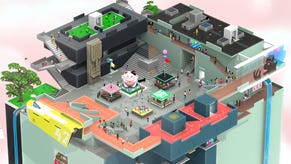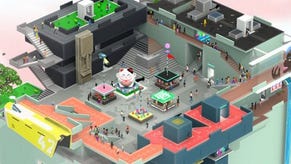Tokyo 42 only somewhat reluctantly fixes its biggest flaw
Less death-by-camera
Hey-o. Very pretty isometric assassination game Tokyo 42 has just put out an update that aims to resolve one of the more common complaints about it - that its rather rigid camera was one of the main causes of death and/or frustration. Things'll be different from hereon out.
Publishers Mode 7, of Frozen Synapse fame, have also explained exactly why, seven months on, they've kowtowed to feedback from whingey, bad-at-games hacks like me at this late stage - and why they didn't until now.
Mode 7 have their cake and eat it by both declaring that they ultimately agreed a change was needed AND writing the hitherto only imagined snarky response they would have liked to send to those who objected to the originally-intended vision. Find it all in a fascinating post here.
To be clear, I am absolutely down with this approach even though I and everyone else who griped about the camera are somewhat in the crosshairs here. It's a rare and valuable thing to see someone's creative thought process, including their defensiveness, pride and eventual relenting, to this extent, and it shines a light on the sustained battle between creative vision and being open to feedback. (To also be clear, Mode 7 themselves were publishers and funders rather than developers, the latter in fact being SMAC, but the Frozen Synapse dudes have clearly been very closely involved in Tokyo 42's creation).
I do feel slightly subtweeted (or whatever the term we used for such things was before social media replaced all human conversation), in that Mode 7's imagined/withheld response to initial criticism hinges heavily on claims that Tokyo 42's camera had to be rotated 'constantly.'
“I have read 'you need to constantly rotate the camera' many times in both press and Steam reviews: this is patently false. You do not have to rotate the camera constantly to play the game: you often need to pick an angle and leave the camera there for a while, then make a specific choice to rotate it again later. “Constantly”, or a similar adverb here, betrays a fundamental lack of appreciation for the game's basic mechanics, and so any related criticism can be dismissed out-of-hand.
*Checks own review*.
"To play T42 on PC is to be constantly hammering Q and E to rotate the camera, and often doing so in the wrong direction because it’s not always apparent how the image will shift, thus obfuscating your view further."
Well looky-here. Granted, I'm being a bit Warren Beatty to Mode 7's Carly Simon here, as it's the kind of term that got thrown around a bunch in Steam reviews too, but my camera-whingeing is specifically quoted elsewhere in the response, so clearly it was very much on their radar. Again, I'm perfectly comfortable with this criticism of my criticism, and the fact that I've just bought a caterer's pack of mixed-size eggs and gone looking for Paul Kilduff-Taylor's house is purely a coincidence.
Anyway, Mode 7's point is that, despite thinking this stuff, they didn't actually say it at the time, and instead let the feedback swirl around in their heads - "being defensive is always the wrong approach to feedback of any kind," they argue. For my part, was 'constantly' a bit too melodramatic? Sure, but often you're writing about how the overall experience feels rather than necessarily a forensic description of the mechanic, and my feeling was certainly that the camera was a persistent obstacle to enjoying myself.
Even if rotation was every few seconds rather than 'constant', the issue was that I kept on having to frustratedly search for an angle from which I could see what I was doing, who was shooting me, what I could safely jump across and what direction I had to leap in in order to land neatly on the bonnet of a flying car. And, moreover, that the chosen system of doing this was actively an interruption to the rest of the game, as opposed to how almost subconcious camera-tweaking is in other games.
Which brings us to what's been changed. Let's show rather than tell:
Or, in short: though the need for very regular manual camera rotation in fixed 45-degree increments hasn't changed, you can now see a silhouette of your character and any enemies even if there's a building in the way. In other words, it should be a lot quicker to orient yourself, regardless of which way the camera is facing, and you won't necessarily face death-by-ill-placed-plant-pot quite so often. The idea, too, is that this addition makes life easier for whingeing dickheads like me without actually disrupting the core experience for those who clicked with the original system.
Something else I appreciate in the update notes is the extent to which they break down what goes into a decision like this. It's very easy for me to sit here in my knackered, seven-year-old Ikea office chair and presume it was originally 'just' a case of prioritising aesthetic over experience, but clearly they did a lot of work, went through a lot of permutations and, for whatever reason, saw the system fully endorsed in private playtesting in addition to being very proud of how the game looked. And, subsequent to that, making a change that potentially effects every single moment of how the game plays is not even remotely straightforward.
If you've ever been guilty of thinking 'lazy/stupid developers', or words to that effect about a game or game feature you've been dissatisfied by, Mode 7's update notes are a valuable behind-the-scenes game development read, whether or not you're interested in Tokyo 42 specifically.
There are lessons, too, for frustrated players who want certain changes to be made - "Explaining the issue clearly and expressing how it affects your play gives the developer the highest quality information possible. As soon as criticism becomes vague, incoherent or vitriolic (“the camera is dumb”), it becomes a lot harder to parse and easier to ignore." I mean, we've all been there, right? None of us are likely to take the advice of someone who's obnoxious to us.
There's so much we never see about how the sausage gets made; sure, sheer bloody-mindedness is a part of any game development, but the balancing act is extremely delicate.








